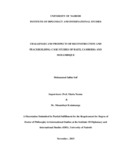| dc.description.abstract | Based on the experience of three countries- Haiti, Cambodia and Mozambique; this study set-out to examine how various peace building strategies could be used to formulate a framework for post conflict reconstruction. Informed by the premise that research on the formulation of a comprehensive framework for reconstruction is sparse and limited, the study found its worth in filling the knowledge gap occasioned by insufficient understanding about the prerequisite human and material conditions necessary for effective and sustainable post conflict reconstruction. The democratic peace theory was utilized here in the context of accounting for requisite conditions necessary for favourable security, humanitarian and relief efforts, economic recovery, democratization and governance, and longer-term development in post-conflict societies. In this regard, the democratic peace theory focuses on the construction of state capacity by taking both collective security and human security as the core of peace building and to a larger extent state building with a broad strategy of preventing, managing and resolving conflicts in the long-run as well as restoration of comprehensive peace and security in the short run. In its methodology, this study adopted a case study design and used an open ended questionnaire method for data collection. Post conflict reconstruction data on Haiti, Cambodia and Mozambique was collected from officials in the diplomatic corps, UN Officers, People working with international organization like AU, military officers, Government officers, media professionals and Academicians with proven knowledge on post conflict reconstruction globally. The study used Proportionate stratified sampling and Purposive Sampling Techniques. Proportionate stratified sampling was used to identify the necessary study population in Haiti, Cambodia and Mozambique. Purposive sampling was used to identify the six study units which included: officials in the diplomatic corps, UN Officers, Media professionals, academicians, Government officers and military officers who were in one way or another well informed and involved in issues surrounding reconstruction of post conflict societies. The findings of this study indicate that fragile post conflict societies require multiple interventions in their reconstruction process. The experiences of Haiti, Cambodia and Mozambique indeed underscore the fact that post-conflict reconstruction is a central feature on the international developmental agenda. Nonetheless, these interventions must address the key pillars of the post conflict reconstruction framework, namely: legitimacy, trust and authority of the state, political will for transparency and accountability, rule of law, social capital and social cohesion, economic reconstruction and service delivery and finally, security and cross border movement. Subsequently, the study recommended that future post conflict reconstruction strategies must pay attention to the issue of entry and how to harmonize policies and make them converge towards the common goal of sustained development and prosperity. Furthermore, post conflict reconstruction processes must be alive to the fact that governments should always strive to identify an appropriate mix of policies; and they need to know where and when to start, and what follows what? Hence, for the political and managerial leadership, great capacities are required with regard to empathy and timeliness for action. Finally, reconstruction cannot be successful without strategic partnerships with international institutions, which is crucial towards strengthening local governance capacities. | en_US |


